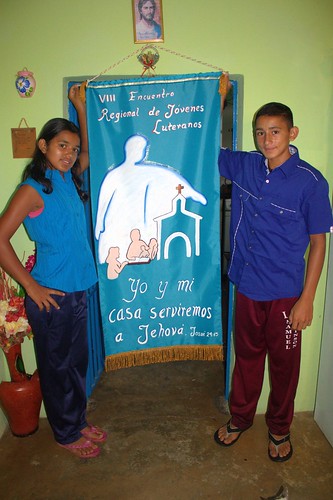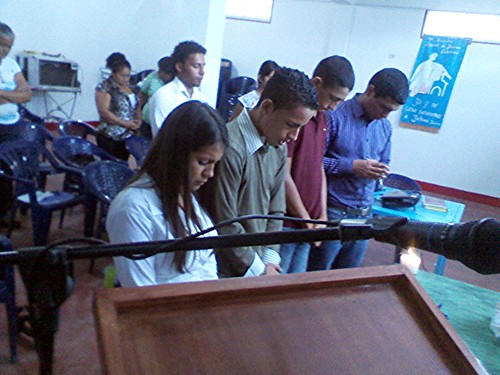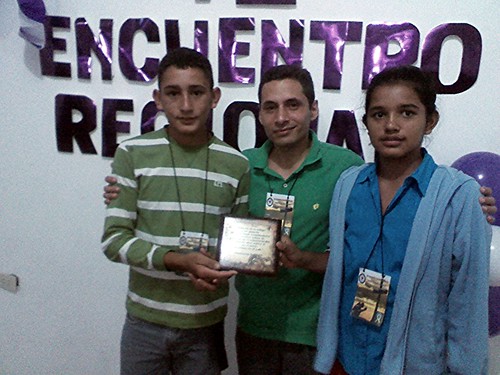 Luz Maria took two of her grandchildren, Pedro and Karelis Santana, to the eighth central-western youth gathering of the Lutheran Church of Venezuela, August 16 to 18, 2013. The gathering was hosted by Pastor Miguelangel Perez and members of Nueva Vida (New Life) Lutheran Mission in Barquisimeto at a campground in the state of Yaracuy. Congregations in Caracas and Maracay also were represented.
Luz Maria took two of her grandchildren, Pedro and Karelis Santana, to the eighth central-western youth gathering of the Lutheran Church of Venezuela, August 16 to 18, 2013. The gathering was hosted by Pastor Miguelangel Perez and members of Nueva Vida (New Life) Lutheran Mission in Barquisimeto at a campground in the state of Yaracuy. Congregations in Caracas and Maracay also were represented.Pedro and Karelis came by to study the book of Joshua (the Biblical focus of the retreat) every evening for several weeks before the event. They also developed a drama for the gathering's “talent night”, based on the book of Habakkuk. Habakkuk is one of the books of the so-called “minor prophets.”
The booka of the “major prophets” are Isaiah, Jeremiah, Lamentations (of Jeremiah), Ezequiel and Daniel. The 12 books that follow the major prophets were originally referred to as “the 12 prophets” in Hebrew and Greek writings. They are not referred to as minor because of a lesser degree of divine inspiration, authority or reliability. They are minor in that all 12 books are very brief compared to those of the major prophets.
Key passages from the minor prophets undergird New Testament teaching. For example, Micah 5:2 is quoted as part of the Christmas story in Matthew 2:6. Likewise, the Apostle Peter hails Joel 2:28 as fulfilled prophecy in Acts 2:17, and quotes Amos 9:11-12 in Acts 15:116-17.
Now Habakkuk may be the most obscure of the minor prophets. I have known, or heard of men today named Joel, Amos, Micah, Jonah or even Malachi, but I have never even heard of someone in modern times named Habakkuk. Yet this very obscure book contains a phrase very well-known because of it use in Romans 1:17 and Galatians 3:11. St. Paul not only cites Habakkuk 2:4, he bases his entire presentation of the doctrine of justification on it: “But the just shall live by his faith.”
Habakkuk lived more than 600 years before Christ, at a time when violence, theft, robbery, family feuds, legal and illegal lawsuits and all manner of injustice prevailed in the land of Israel. The greed and covetousness of those who had amassed wealth and power for themselves had resulted in poverty and destitution for many. God reveals to Habakkuk that He will raise up the Chaldeans, a foreign power, to conquer Israel and bring about the downfall of those who disregard His holy law.
The Chaldean, or Neo-Babylonian, Empire began in 626 B.C., when Nabopolassar, king of Babylon, lead a revolt against the Assyrian Empire. Only 13 years later, Nineveh, the capital of Assyria, lay in ruins. Seven years after that, Nabopolassar's successor, Nebuchadnezzar, would defeat and rout the armies of Egypt. The Chaldeans would destroy Jerusalem in 568 B.C.
Habakkuk asked God the perennial question: Why should the righteous suffer along with the wicked? Those in Israel who tried to live according to God's will already felt “hemmed in” by those who did not. Would not they also be enslaved by cruel, rapacious conquerors? Did this mean that the Lord was breaking his covenant with Abraham and abandoning Abraham's descendants? Where was God's justice and mercy in a world where the survival of the fittest seemed to be the only law?
Although the book of Habakkuk was written centuries ago, for Venezuelans these themes seemed ripped from the latest national headlines. Venezuelans today also live in a time of rising violence, crime, corruption and shortages of food and other basic necessities. In addition to these worries, many fear an invasion by the great power to the north, the United States, would only make things worse. That is why Pedro, Karelis and Luz Maria chose to base their play on Habakkuk.
 God's answer to Habakkuk is the same as it is for us in these times. The hour of God's judgment will bring only destruction and despair to those who will not repent of their sins, but those who by faith believe in God's promises will not only endure, but receive blessings far in excess of their sufferings. To Habakkuk and people of his day, the Lord said that the people of Judah would not be destroyed, because among them would be born the Messiah, the Savior of the world. This was the covenant that would not be broken and would be fulfilled at its appointed time. The Chaldean Empire would crumble to dust as quickly as it rose, as will all the kingdoms and empires of this world.
God's answer to Habakkuk is the same as it is for us in these times. The hour of God's judgment will bring only destruction and despair to those who will not repent of their sins, but those who by faith believe in God's promises will not only endure, but receive blessings far in excess of their sufferings. To Habakkuk and people of his day, the Lord said that the people of Judah would not be destroyed, because among them would be born the Messiah, the Savior of the world. This was the covenant that would not be broken and would be fulfilled at its appointed time. The Chaldean Empire would crumble to dust as quickly as it rose, as will all the kingdoms and empires of this world.Like the people of the Old Testament, we do not always understand why God permits things to happen as they happen, but we trust that He is in charge and that ultimately His purposes will be accomplished at the appointed time. This includes the second coming of Christ, at which time He will judge the nations and those who have lived by faith will pass into eternal joy and the wicked into eternal fire.
By the way, our group won first prize for their presentation on talent night and generally a good time was had by all.



No comments:
Post a Comment